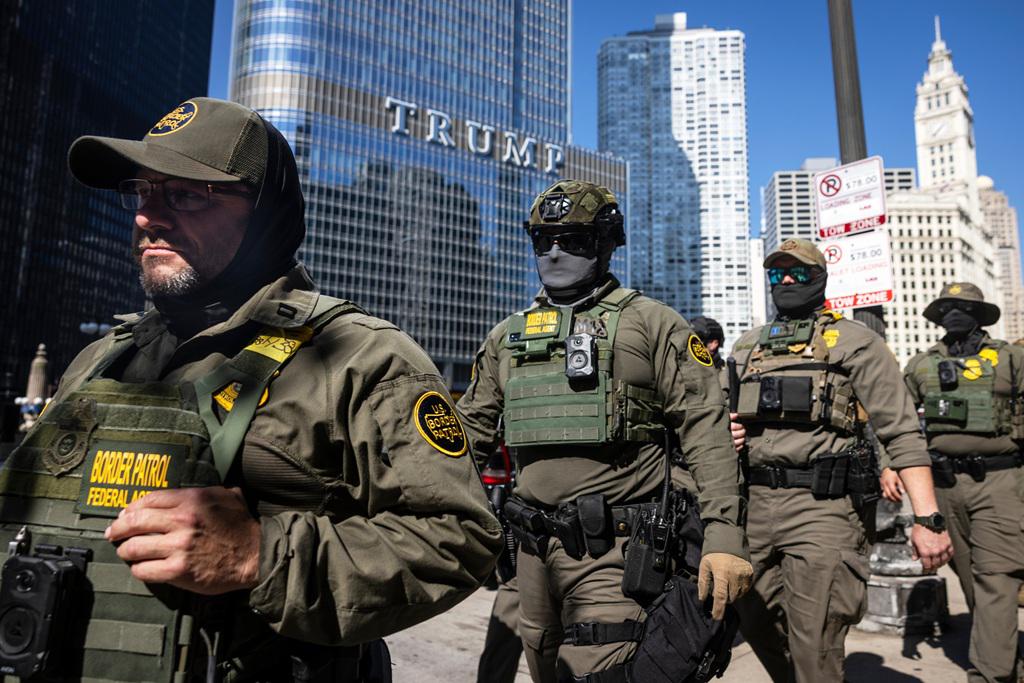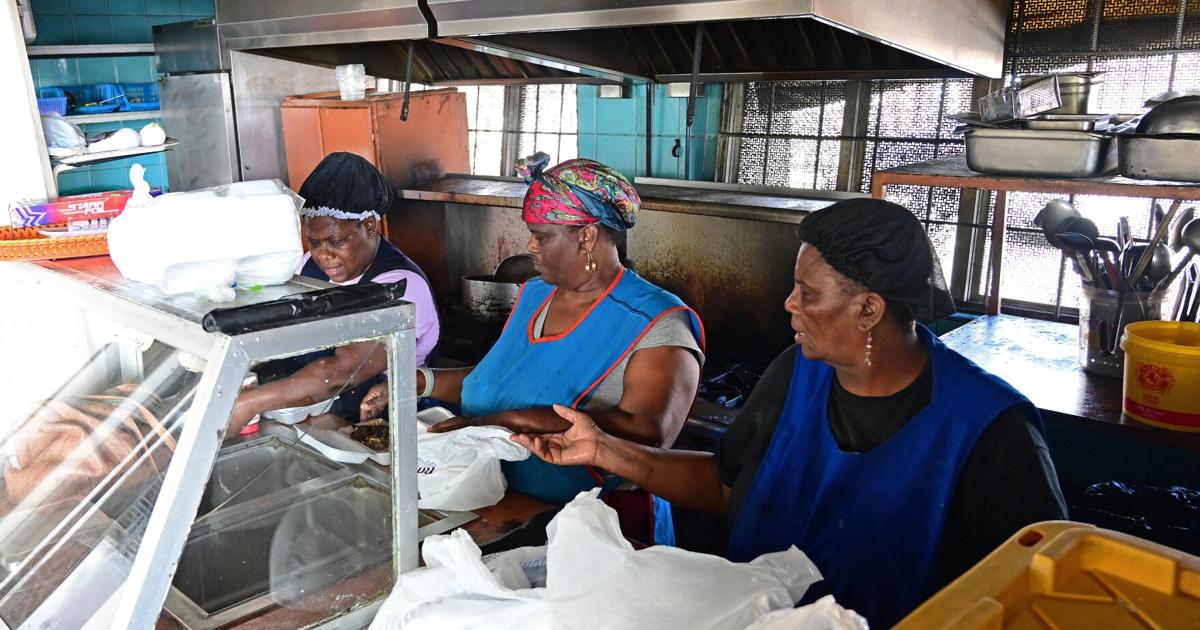By Sarah Lazare
Copyright prospect

This article is a joint publication of The American Prospect and Workday Magazine, a nonprofit newsroom devoted to holding the powerful accountable through the perspective of workers.
CHICAGO – The last time Regina heard from her mother, Laura Murillo, she was calling from inside the ICE detention center in Broadview, Illinois, last Friday. “She just told us that she loved us. She seemed shocked, and she said she’s wanting to fight the case,” Regina says.
Regina, 19, is standing at the street vendor booth in the Back of the Yards neighborhood of Chicago, where Murillo was detained. She’s now missing college to work at the booth, selling tamales and champurrado, a Mexican hot chocolate drink, to make sure the business doesn’t go under. Video footage shows Murillo, 54, being arrested by at least three masked federal agents at this site last week, while onlookers shouted at them to let her go.
Regina, who requested I use a pseudonym to protect her privacy, wipes away tears as she explains that she believes her mom was racially profiled and swept up in a broader attack on workers in the area.
“My sister needs her,” says Regina, pointing to her 16-year-old sister standing next to her. “We need her.”
Since the Trump administration unleashed “Operation Midway Blitz” on September 8, workers across the Chicago area have been targeted at hiring sites, on the way to work, and as in the case of Murillo, while on the job. While the Department of Homeland Security says it has made 500 detentions in Chicagoland, Brandon Lee, communications director for the Illinois Coalition for Immigrant and Refugee Rights, cautioned against citing the agency’s numbers as fact, because “ICE lies.” While rapid response organizers told me they don’t have their own independent tally, they are certain that detentions are escalating.
Organizers say that the crackdown has created a climate of fear and intimidation that is not only directly harming workers and their families, but is also stifling ongoing worker efforts to improve conditions on the job, and organize to protect themselves from raids. There are documented cases of employers seemingly taking advantage of this climate to clamp down on organizing efforts among their workforce. “The atmosphere that the Department of Homeland Security is trying to create is one where they’re chilling speech and chilling organizing among immigrants, among immigrant workers, and among advocates,” Lee says.
THERE IS A CLASS COMPONENT to this crackdown. Unlike the immigrants now being abducted off the streets, employers rarely find themselves the target of immigration enforcement, beyond fines that are already factored into their cost of doing business. As Jean Reisz, co-director of the USC Gould School of Law Immigration Clinic, told the Los Angeles Times in June, Donald Trump—who himself has a long record of employing undocumented people—has no interest in criminalizing those in his class orbit. “It doesn’t fit the narrative to penalize employers,” Reisz said.
The same can’t be said for the day laborers, textile workers, street vendors, and domestic workers being rounded up en masse in the United States.
Miguel Alvelo Rivera, executive director of the Latino Union of Chicago, a worker center, is standing around the corner from Regina’s street vendor booth, in front of a Home Depot on 47th and S. Western Avenue that has become a target of ICE crackdowns on day laborers, who often gather at hardware stores to get hired for work. Numerous day laborers have been detained at this location and nearby, though organizers don’t have an exact number.
“When I speak with my neighbors, the people that have crossed rivers, deserts, and oceans, have risked their lives, have lost their loved ones, to make it to this city, this country, the hope for peace, in the hope for a better life, and then they encounter violence against them, they encounter pain, they encounter being disappeared, they encounter death in the place that’s supposed to be their sanctuary, I’m mad. I’m angry. Because that’s not right,” he tells a crowd of around 75 people.
Amanda, who requested I use only her first name to protect her privacy, is one of the leaders for the Southwest Rapid Response Team that responds to ICE presence in this neighborhood. “There’s been so much ICE activity that it’s hard to keep it all straight,” she says. “We’ve responded to over 100 sightings in this neighborhood in the past ten days.”
Immigration enforcers in and around Chicago have targeted a homeless shelter and school drop-off, and included a militarized clampdown on protests at the Broadview ICE detention center. On Sunday, more than 50 armed, masked federal agents marched through downtown Chicago detaining people, with Gregory Bovino, commander at large of the border force, telling one reporter that the agents were detaining people based on “how they look.” Bovino, who also led ICE efforts in Los Angeles, represents an apparatus that is better funded than most of the armies in the world, after the Trump administration’s budget bill, signed on July 4, allocated $170 billion to immigration enforcement.
Months before the latest “blitz” began, Chicago communities were escalating their own organizing to defend immigrants. Across the city and surrounding suburbs, communities have been organizing know-your-rights trainings and rapid response networks, and workers have organized with unions and worker centers, to help keep immigrants—or those simply perceived as immigrants—safe.
This includes demands by the Latino Union of Chicago and the Raise the Floor Alliance that the city of Chicago urgently establish safe hiring sites so that day laborers are protected while they’re looking for work, including by making funding available for the required infrastructure. The groups have also highlighted community efforts to adopt street corners where day laborers are known to work. “We are working closely with existing rapid response networks across Cook County to push community members to adopt their local hiring corners,” Geovanni Celaya, a migrant worker organizer for the Latino Union of Chicago, said at the rally in front of Home Depot. “However, we know that isn’t enough.”
Organizing to defend immigrants spans across sectors. The Chicago Teachers Union has been organizing safe transport for immigrant families, and reactivating its safety committee that met during the height of the COVID pandemic. Sylvelia Pittman, who works at Nash School of Fine and Performing Arts, where around one-quarter of the students are from immigrant families, told me two weeks ago, “We’ve been making sure that our parents and students know their rights, defend their rights, letting them know that they do not have to talk to anybody. Now we are in the process of setting protocols for our schools, making sure that everybody in our buildings knows what the proper protocols are.”
Yet the current climate is also making organizing more difficult. On September 25, the same day Murillo was detained, members of the Southwest Rapid Response Team went to the parking lot of a Dollar Store around the block. “Our folks responded to that sighting and were confronted with 20 armed agents, head-to-toe tactical gear, helmet, bulletproof vest, rifles in hand,” Amanda says. The federal agents surrounded the rapid responders, Amanda says, “and they grabbed one of our members, pulled her and physically assaulted her.” When rapid responders are physically stopped from doing their jobs, she says, it puts immigrant workers at greater risk.
AND THEN THERE IS THE TREND, which is difficult to quantify, where employers are taking advantage of the climate to repress worker organizing. I’m in touch with immigrant workers at a warehouse not far from Chicago, where two men were fired, allegedly in retaliation for participating in a July 25 march on the employer and its temp agency, demanding that the company honor their earned vacation time and give them raises. The workers are what are known as “perma-temps”: They work for temp agencies, even though they’ve been employed long-term at the same warehouse, some of them for over ten years. (In a sign of the times, organizers asked that I not share the name of the company or the temp agency, worried that ICE would carry out a raid.)
The workers say they have faced direct discrimination as immigrants. At one point during the delegation, in response to a request for a raise, a manager said that he doesn’t give raises to undocumented immigrants, according to a worker, whose account was corroborated by an organizer at Warehouse Workers for Justice. While the workers did eventually get a modest raise, their vacation demands were denied, and they say they face a workplace plagued by disrespect and mistreatment. “Everybody should demand their rights, because we are not animals to be treated like they’re treating us,” said one worker, who requested anonymity to protect him from retaliation.
The Latino Union of Chicago believes that one of its own members, Willian Giménez González, was targeted by ICE in retaliation for being one of five day laborers launching a federal lawsuit. The lawsuit was filed in August 2024 against the city, Home Depot, and off-duty police officers who do security for Home Depot. It alleges that security beat and harassed the workers, then brought spurious trespassing charges against them, part of “a conspiracy to criminalize day laborers’ attempts to find work in Chicago.”
But then, in the midst of the lawsuit, Giménez González was abducted outside a barbershop on September 11. Community groups immediately sounded the alarm that this was retaliation for his efforts to advocate for his rights, as Ari Bloomekatz and I reported for In These Times and Workday Magazine. “Willian was double-profiled, and now he’s suffering consequences within the ICE detention system,” said Kevin Herrera, legal director of Raise the Floor Alliance, and attorney for Giménez González.
At the September 29 rally, we are standing outside the Home Depot where Giménez González once worked, and suffered the alleged beatings. “As we continue to fight for Willian, he has also continued to fight and endure the precarious conditions of detention. We ask for your unconditional support as we fight to get him out,” Celaya says to the crowd.
Marisa Díaz, director of the Immigrant Worker Justice Program at the National Employment Law Project, tells me, “All employees, regardless of their immigration status, have almost all of the same workplace rights. That includes the right to organize collectively with their co-workers to improve their workplace conditions. Also, it is illegal for employers to retaliate against workers when they exercise their rights. That protection applies to all workers, regardless of immigration status.”
Whatever laws exist on paper, however, in the current climate, there is much that employers are able to get away with, a reality that extends well beyond Illinois. An attorney for a building trades union told me that a witness in a wage theft case in another state was recently targeted and deported by ICE. The union believes the employer encouraged ICE to target the worker, in a bid to undercut the wage theft case. Because the family is concerned about their own safety, the attorney asked me not to share specifics about the case, the individuals or union involved, or even the state where it happened.
Some employers rely on the ever-present fear of immigration enforcement to chill workers from speaking out about wage theft or other abuses on the job (though, in reality, immigrant workers have also been critical to fighting bosses’ abuse, and building unions and worker centers in the United States). That threat is only heightened in the Trump era, and if employers are not held accountable for these abuses, some will continue to exploit the situation.
In fact, the exception to the rule of accountability for employers is particularly revealing. Rafie Shoued, a 79-year-old Muslim American and U.S. citizen who owns a car wash in Van Nuys, California, was body-slammed while trying to show ICE agents legal authorization for his workers during a raid on his business earlier this month. The agents then detained Shoued for 12 hours and denied him medical treatment, questioning his immigration status. He has sued the Department of Homeland Security for $50 million.
REGINA IS IN HER OWN PITCHED BATTLE to get her mother out of detention. She seems like she is still stunned that her mother was detained. Murillo has been a street vendor for 20 years, working seven days a week, all day long, in this neighborhood, says Regina. Murillo saved money all year so that the family could go on a four-day trip to Wisconsin; they took the trip in late June.
Murillo is generally an optimistic and happy person, but recent events have been testing her resilience. “When I talked to her, she told me that they were quite aggressive with her,” says Regina. “That’s all she told me.” Murillo’s fiancé, Jaime Perez, says he was on the phone with her while she was detained. “She was shouting, ‘You’re hurting me!’” he says.
The local community did a fundraiser for Murillo, and Regina says she finds the support comforting. “A lot of people knew my mother. A lot of people are trying to help her. A lot of people are sending their love. And I wish she was here to see it.”



